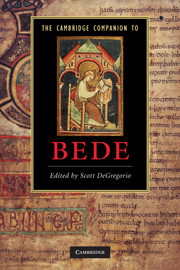12 - Bede and history
from Part II - Bede's Writings
Published online by Cambridge University Press: 28 January 2011
Summary
Bede was in many ways a natural historian. He was deeply interested in the past. He liked to sort things out, get things right. Indeed he was so good at this that he has been viewed as a modern scholar avant la lettre. But that interest in accurate information is deceptive. Bede had an agenda. He was above all a Christian scholar and exegete, and for him, history, although unquestionably interesting for its own sake, had moral purpose. To study and to write history was to participate in a dynamic process: the unfolding of God's purposes for mankind as the world moved towards final judgement and the end of time. Such an approach linked history with hagiography, the lives of the saints, which told of men and women through whom God had worked his purposes on earth. To the modern mind, these two disciplines might seem at odds. History is about particularity, about the specificity of the past, albeit searching out patterns in the flow of events. Hagiography as a genre is dominated by topoi, by models and conventions, for it seeks to show through the surface detail of particular and individual human lives the underlying quality common to the saints in their service to God. It is also much concerned with miracles, with God's interventions in the natural world to demonstrate the holiness and power of his elect.
- Type
- Chapter
- Information
- The Cambridge Companion to Bede , pp. 170 - 190Publisher: Cambridge University PressPrint publication year: 2010
- 5
- Cited by

